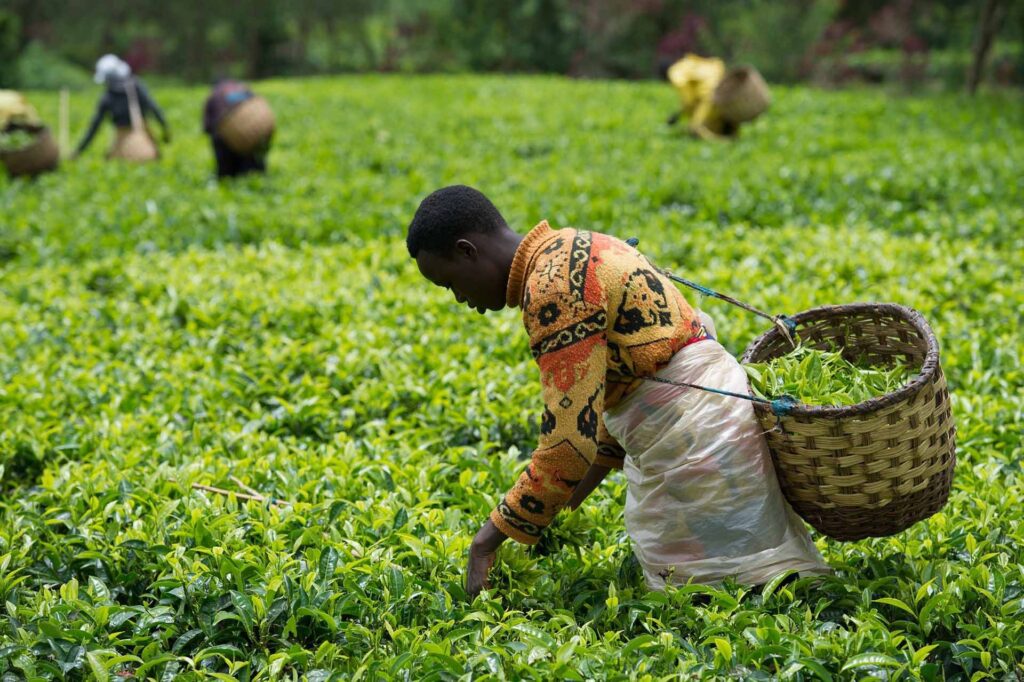Tea in Rwanda
Tea in Rwanda: Rwandan tea is cultivated in the country’s volcanic areas, where the temperature and rich soils provide the ideal growing conditions. When tea was first brought to Rwanda in 1952, it was welcomed by the farmers, who had been exposed to coffee years before.
This accelerated the growth of tea, which is currently the nation’s greatest cash crop, second only to coffee. Both private and cooperative tea growers in Rwanda cultivate tea on expansive estates spread across the country’s hills. The regions in which Rwandan tea is grown—regions with high elevations and mountain slopes—are responsible for the tea’s distinctively rich and robust flavor.

Tea factories located around the nation process the tea leaves after they are gathered from the various estates. Following processing, the final product is disseminated throughout the nation for domestic consumption, with a larger portion being exported to foreign nations.
Some tea plantations and factories are open to the public throughout the year. You visit these plantations and factories during your tea tour to learn about the richness of Rwandan tea, including how it is harvested and processed, as well as to sample this distinctive and flavorful tea.
Although there are other locations in Rwanda that are accessible to the public, the majority of tea tours in Rwanda take place in the Gisoyu and Gisakura areas of Nyungwe National Park.
Gisovu
The tea estates are situated in the northern part of Nyungwe National Park, right up against the massive Nyungwe forest. The tea farm provides you with breathtaking views of the green, shimmering leaves that are tossed by the wind in all directions. You may appreciate the various phases that tea goes through before it is in your cup when you take a tour of this farm. You will get the opportunity to engage with the wonderful people surrounding Nyungwe Forest, particularly the tea growers, take part in the cupping ceremony, and go mountain biking on a variety of terrains.

Gisakura tea estate in Gisovu
Located immediately west of Nyungwe National Park and the magnificent Nyungwe forest, Gisakura tea estate is Rwanda’s most well-known tea plantation location. Out of all the tea estates in Rwanda, this one receives the most visitors. Gisakura is breathtakingly gorgeous, with lush green surroundings and cool winds that provide for an amazing tour experience. Walking through the tea estates, tasting the delicious tea, interacting with the locals, and participating in other activities that help you understand Rwandan culture are all part of this tour.
Pfunda
According to estimates, this is the biggest tea estate in the nation and produces the most tea when compared to other tea farms. The estate employs a variety of farmers and covers an area of 100 hectares. This plantation is located just beneath the Virunga Volcano, and the soil on the volcanic slopes is ideal for growing tea. The soils are the result of volcanic eruptions, and when paired with the high elevation of the volcanic slopes, they create the ideal conditions and soils for premium tea.
You will witness farmers sowing seeds, caring for mid-grown plants, and harvesting tea, depending on the season you visit. You will have the opportunity to sample this rich Rwandan tea, just like on the other plantations.
Since colobus monkeys and other primates reside in parts of the vast Nyungwe forest, it is likely that you may encounter them on any of the tea plantation tours.
If you are not in a rush to return to your hotel, all tea plantation visits last three to four hours or longer. However, if you are extremely pressed for time, you might ask for the tour to last roughly two hours.
In Rwanda, tea is called pfunda tea.
You cannot schedule a visit with the tea farmers or plantation owners; instead, you must use a travel operator or the Rwanda Development Board.
However, the tea producers or various local cooperatives conduct and lead all of the visits.
You can choose to take a full day tour of the tea plantations and then spend the night at one of the local lodgings because all of the tea estates are close to well-appointed, well-equipped lodgings with modern amenities that will meet all of your demands.
If that is not your goal, you can see the Virunga and then return to Kigali. However, if you have a tea plantation tour in Nyungwe, you will have to spend the night there because it is not possible to make the trip back after a tour that lasts more than three or four hours.
Having said that, your tour operator will provide you with all the trip instructions, and you will undoubtedly have a great time on your Rwandan tea plantation tour.



